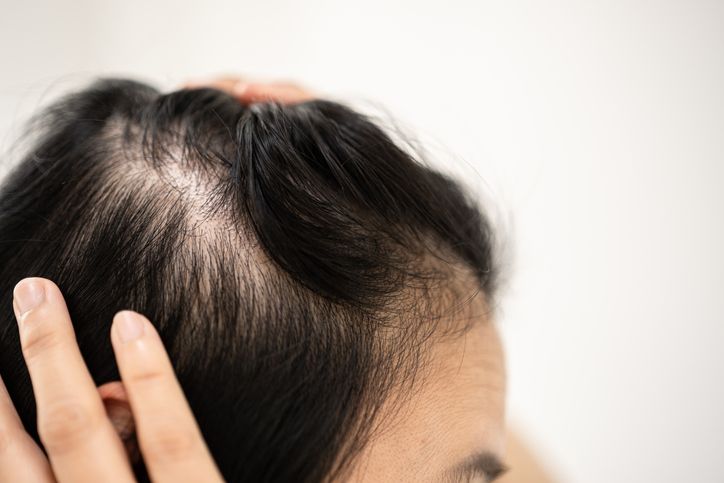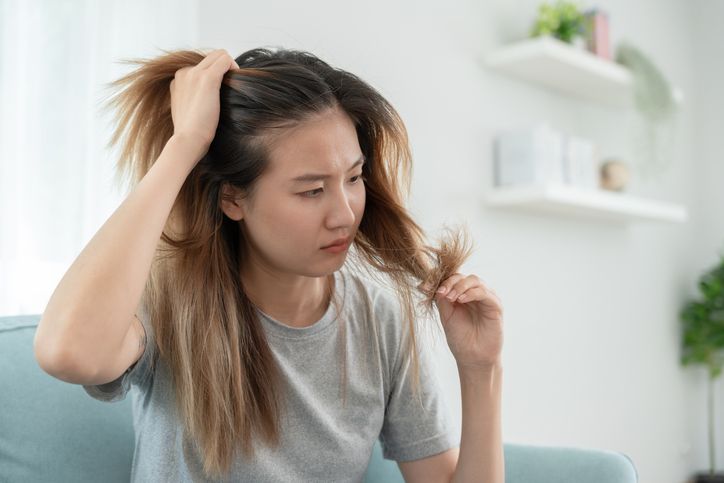
- Home
- Trend
- Weight Loss Strategies
- Acne Tips
- Hair Health Information
- Blemish Removal Tips
- Acne Scar Removal Tips
- Muscle Building Techniques
- Intimate Care Tips
- Postpartum Intimate Care
- Eye Bags Wiki
- Tips for Face Slimming
- Secret of Permanent Hair Removal
- Breast Enlargement Tips
- Cure to Snoring
- Marionette Lines
- Skin-Tightening Secrets
There are now a wide variety of Western and Chinese treatment options available to help women manage hair loss. But before diving into any remedy, it’s important to first understand what’s causing the hair to fall out — that way, you can choose the most effective treatment.
1. What Counts as “Abnormal” Hair Loss?

Not all hair shedding requires treatment. Hair naturally goes through a growth cycle that includes the growing (anagen), transitional (catagen), and resting (telogen) phases — so some daily shedding is perfectly normal. If you’re losing around 50 to 100 strands a day, there’s generally no need to worry. But if you’re losing more than 100 hairs daily, or noticing clumps falling out, that may signal an underlying issue. In such cases, it’s best to seek treatment sooner rather than later.
2. Is Hair Loss Inevitable with Age?

It’s a common belief that hair loss is just a part of getting older, prompting many women to start treatment as they age. But hair loss doesn’t only affect older women — younger women can also face thinning hair due to a range of causes. Knowing what’s behind the hair loss is key to getting it under control early on.
Common Causes of Hair Loss in Women
1. Genetics
This is the most common reason. If hair loss runs in the family, you may inherit genes that make your hair follicles more fragile. Hormones play a big role too — higher levels of dihydrotestosterone (DHT) can shrink genetically sensitive follicles, leading to thinning hair, receding hairlines, and patchy crowns.
2. Medications or Scalp Trauma:
Certain medications (like chemotherapy, blood thinners, antidepressants, or birth control) can trigger hair loss. Scalp injuries or surgeries may damage follicles, causing scarring and permanent hair loss (known as cicatricial alopecia).
3. Postpartum or Menopause:
After childbirth, women often experience shedding due to blood loss and postpartum stress. During menopause, estrogen levels drop while androgen levels (and DHT) rise — which can impact hair growth.
4. Daily Habits:
Poor diet and lack of sleep can also contribute. Greasy, spicy foods can increase scalp oil production and clog follicles, while inadequate rest can slow metabolism and reduce nutrient delivery to the scalp.
免費體驗
F8 Hair Regrowth Treatment
1 Minute Self-Registration
Date should not be before minimal date
3. Why Isn’t My Hair Loss Treatment Working?
Tried several treatments but still saw hair fall? Sometimes it’s not the treatment itself, but how it’s being used — or what’s being overlooked.
1. Not Targeting the Root Cause
Effective treatment starts with identifying the specific cause. Without a tailored approach, it’s hard to see meaningful results.
2. Using Ineffective Remedies
Just because something is trending online doesn’t mean it works. DIY treatments like rubbing ginger on the scalp, washing hair with beer, brushing 100 times a day, or taking birth control pills haven’t been scientifically proven and may even worsen hair loss.
3. Ignoring Mental Health
Stress can take a toll on your scalp. Tension restricts blood flow to follicles, reducing nutrient delivery. Addressing emotional well-being should be part of any treatment plan.
4. Can Hair Products Really Help?
Before committing to a treatment plan, many women try non-prescription products first — but how effective are they really?
Popular Hair Loss Products:
1. Caffeine Shampoo
This drug-free option is popular for its supposed follicle-stimulating effects. Some studies suggest caffeine can boost hair growth by activating follicles, but it must be left on the scalp for at least two minutes to absorb. That said, large-scale studies are still lacking.
2. Hair Growth Supplements
Vitamins like protein, iron, zinc, and vitamin E support healthy hair. While supplements can help as part of a balanced routine, they aren’t a guaranteed fix — and excessive intake can backfire.
3. Hair Growth Foods
Oysters, avocados, salmon, carrots, and eggs are rich in nutrients that support growth. While a nutritious diet helps overall hair health, food alone isn’t a proven treatment for hair loss.
5. How Does Traditional Chinese Medicine (TCM) Treat Hair Loss?
Western medicine often focuses on treating symptoms with medication or procedures, but TCM takes a more holistic route. It emphasizes restoring internal balance and strengthening the body to address the root cause of hair loss.
How TCM Views Hair Loss?
According to TCM, hair health is closely linked to the liver, spleen, kidneys, and the overall flow of blood and qi (energy). Healthy hair is said to reflect strong kidney function and sufficient blood supply. If these systems are imbalanced, the body can’t properly nourish the scalp and follicles, leading to hair loss.
Common TCM Approaches:
1. Stress Reduction
Emotional strain is believed to affect blood and qi flow. Calming the mind helps detoxify the liver, support kidney function, and improve scalp circulation.
2. Loosening Tight Hairstyles
Frequent ponytails or buns can strain follicles. Letting your hair down gives the roots a break and helps follicles recover.
3. Scalp Massage
Using your fingertips to massage the scalp — especially around the crown, back of the head, and above the ears — promotes circulation and nutrient delivery to the follicles. Choose a wide-toothed brush if brushing to avoid irritation.
4. Avoid Sleeping with Wet Hair
According to TCM, going to bed with damp hair can trap moisture, leading to headaches, dandruff, and even hair loss. Dry your hair to at least 80% before sleeping, ideally with a warm (not hot) dryer.
5. Acupuncture for Hair Regrowth
Acupuncture can stimulate blood flow and revive dormant follicles. It must be done by a licensed TCM practitioner, as improper technique can cause harm.
免費體驗
F8 Hair Regrowth Treatment
1 Minute Self-Registration
Date should not be before minimal date
6. Editor’s Review: Tried-and-Tested Western Treatments (No Surgery Needed!)
When it comes to hair loss, many turn to Western treatments like medication or hair transplants. But are those the only options? Our editor (who’s also a mom!) shares her experience testing out one of the city’s most talked-about non-invasive hair growth treatments.
Western Treatments
1. Minoxidil:
A popular topical treatment found in many hair growth tonics. Originally developed for high blood pressure, it works by improving blood circulation to the scalp. Available in 2% and 5% strengths (2% is usually recommended for women).
Editor’s Tip: “I saw baby hairs growing after using Minoxidil! But it left my hair sticky and flat, which made daily use a bit inconvenient.”
2. Finasteride:
An oral DHT-blocker that slows down follicle shrinkage. However, it’s only recommended for men and postmenopausal women, as it may cause birth defects if taken during childbearing years.
Editor’s Tip: “I didn’t take this because I haven’t reached menopause. Since it affects hormone levels, I’d only consider it if absolutely necessary.”
3. Hair Transplants:
Often seen as the “last resort,” hair transplants relocate healthy follicles to thinning areas. Results look natural, but the procedure is invasive and pricey — even just fixing the hairline can cost five figures (HKD).
Editor’s Tip: “I tried a hairline transplant! Recovery was quick, but the area did shed at first. By month 3–4, new baby hairs appeared, and by month 6, my hairline looked fuller.”
4. Low-Level Laser Therapy (LLLT):
Laser treatments like the F8 system at Perfect Medical are gaining popularity. Medical-grade lasers stimulate blood flow and help follicles absorb nutrients.
Editor’s Tip: “After having my baby, I lost a lot of hair. I tried the F8 treatment at Perfect Medical and was surprised by the results! The trial was free after signing up online. The staff did a scalp analysis and explained everything clearly. The 30-minute session was painless and even relaxing — I scrolled my phone the whole time! After a week, my scalp felt less tight and oily, and my hair stayed fresher longer. Highly recommend trying it out!”
Get a Trial: Perfect Medical F8 Hair Regrowth Treatment免費體驗
F8 Hair Regrowth Treatment
1 Minute Self-Registration
Date should not be before minimal date
FAQ

When should I start hair loss treatment?
If you’re losing more than 100 hairs daily, or see excessive shedding during washing or brushing, it might be time to seek help.
Do hair-growth foods really help?
They can support overall hair health, but they’re not a substitute for proper treatment. Consult a professional if in doubt.
Does acupuncture work for hair loss?
Yes — when done by a licensed TCM practitioner. It can boost blood flow and follicle health in targeted areas.
Can women use Minoxidil?
Yes. The 2% formula is suitable for most women. Side effects may include irritation or shedding after stopping. It’s not effective for all types of hair loss, so results vary.
Are there TCM remedies for thinning hair, oily scalp, or hair loss?
Yes—here are three commonly recommended Traditional Chinese Medicine approaches:








